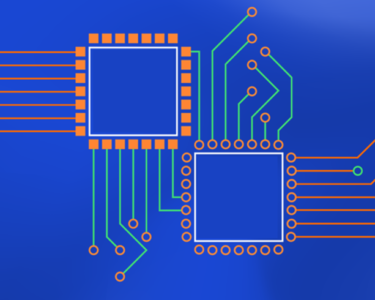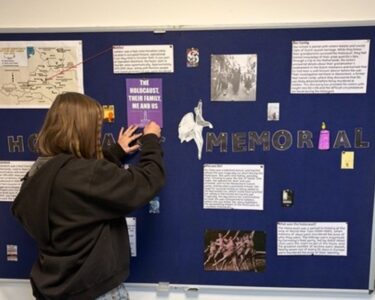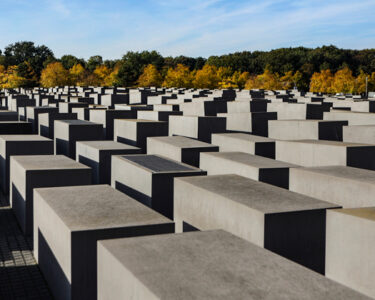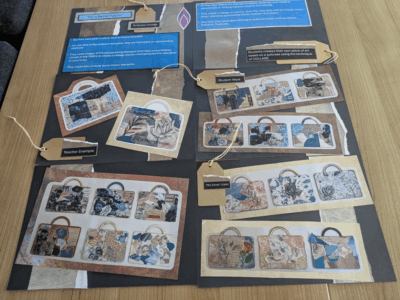 On Tuesday 1st July, TCC hosted a dedicated Holocaust Foundations Day for a selected group of thirty Year 9 students, designed in collaboration with Charlotte Lane and Dr. Nic Wetherall from the UCL Centre for Holocaust Education. This event formed part of our commitment as a UCL Beacon School for Holocaust Education.
On Tuesday 1st July, TCC hosted a dedicated Holocaust Foundations Day for a selected group of thirty Year 9 students, designed in collaboration with Charlotte Lane and Dr. Nic Wetherall from the UCL Centre for Holocaust Education. This event formed part of our commitment as a UCL Beacon School for Holocaust Education.
Titled “All That Remains”, the day was developed by Charlotte Lane from the dual frameworks of The Holocaust, Their Family, Me & Us and Cornish Stories of Survival, and sought to offer students an immersive, reflective, and historically grounded encounter with Holocaust history through the lens of human stories and inherited memory. With input and support from the TCC History Department, the day consisted of five linked workshops which encouraged critical thinking, historical empathy, creative expression, and ethical reflection.
From the outset, the emphasis was not only on knowledge, but on uncertainty — on how we ask questions, how we confront moral complexity, and how we navigate the silences and fragments left in the wake of atrocity. Students moved through a series of interconnected workshops that approached the Holocaust from multiple angles: the personal stories reflected in surviving artefacts; the narratives in architecture and place; the challenges of constructing meaning from loss, and confronting denial in the digital age. The tone was reflective, serious, and grounded in enquiry.
Towards the end of the morning session, students were asked to imagine what they might ask a survivor — or the child of a survivor — if they had the chance. The questions that followed were searching, humane, and deeply considered.
Cynthia Hollinsworth and Bernie Graham, both second-generation survivors whose families fled Nazi persecution, joined the students for the next session. Until that point, the students had no idea that their earlier written questions would be put to people with direct, personal connections to the history they had been studying.
What followed was a thoughtful and respectful exchange. Cynthia and Bernie spoke with honesty and clarity about their families’ experiences, the complexities of inherited memory, and the challenges of speaking about the Holocaust across generations. The students, in turn, responded with maturity, posing questions that were empathetic, searching, and often quietly profound.
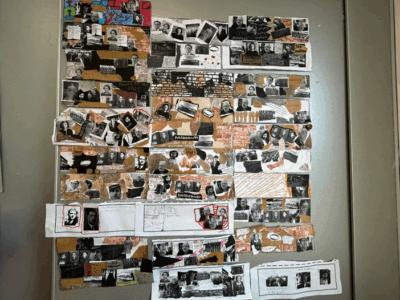 Cynthia’s and Bernie’s responses prompted further reflection. Several students later remarked that hearing from people with a personal connection to the Holocaust made the subject feel more immediate and real. While the event was carefully framed and academically grounded, this unscripted encounter gave a human face to the history they had been exploring, and created a space for genuine engagement that many will remember for a long time.
Cynthia’s and Bernie’s responses prompted further reflection. Several students later remarked that hearing from people with a personal connection to the Holocaust made the subject feel more immediate and real. While the event was carefully framed and academically grounded, this unscripted encounter gave a human face to the history they had been exploring, and created a space for genuine engagement that many will remember for a long time.
We were fortunate to be joined on the day by a crew from BBC South West, who interviewed Cynthia and Bernie, three of our participating students, and myself. The students conducted themselves with exemplary maturity and articulacy; it was clear that they had been affected not only by the personal stories but by the responsibility of representing their peers and their school on a sensitive public platform.
Feedback from families further confirmed the impact:
“I just want to say thank you for giving Oscar the opportunity to participate in the Holocaust event yesterday. He found the day informative and interesting, obviously with sadness too. He came home and told me the stories of the second-generation survivors and what their families went through.” — Parent of Year 9 student
The afternoon sessions (Workshops 4 and 5) encouraged students to build meaning from what they had learned and heard. In Through Walls and From All That Remains, they were invited to construct creative and symbolic responses to the lives they had encountered — to reflect not only on what the Holocaust destroyed but on what, in some sense, remains.
The day concluded with a final reflective task: Dear Cynthia/Bernie…, in which students wrote brief but heartfelt thank-you letters to the guests. These messages, written in the immediate aftermath of the conversation, captured the sincerity and emotional gravity of the experience.
Staff supporting the event were unanimous in their view that this was a powerful and enriching day, not only for students but for those of us engaged in facilitating their learning. We include some of their reflections below:
“The Foundations Workshop was a well-structured and well-planned set of activities that led us all to reflect on ourselves and our communities. Feedback from students that I spoke with after the event highlighted how valuable they found the event. Cynthia and Bernie were open to honest and sometimes challenging questions and their responses were thought provoking. Many learning points were cited for us and wider humanity. Thank you to UCL for continuing to provide a link with the History department at TCC and in particular Charlotte and Nic for organising and running the workshops throughout the day. We look forward to extending this relationship over the months and years to come.”
Mr R. Truan – Head of History and Religious Studies TC
“I believe that the students were clearly engaged generating an array of questions clearly showing their curiosity of how the holocaust left deep scars on survivors and reshaped global human right policies and international law.”
- Dr. Jeremy Plumb, Headteacher TCC
“The student’s engagement was remarkable; their maturity and impeccable behaviour throughout the workshop was commendable. It was inspiring to witness their thoughtful interaction with the second-generation Holocaust survivors, asking insightful question that reflected a deep understanding and empathy.
For them, I believe the workshop provided a profound insight into the events that unfolded during the Holocaust and into the lives of the second-generation survivors, offering invaluable perspectives on resilience and memory.
Dropping in throughout the day for myself was humbling and enriching. The opportunity for us as a college to host these workshops is indeed a privilege, enabling us to preserve history and foster meaningful dialogue.
It was a truly enlightening and impactful day for everyone involved.”
Mrs. S Gardener – Head of Year 9
“I thought that the creation of a display was good as you could see what the students had learnt build throughout the day. Having the external speakers excited the students and got them to consider thoughtful questions to ask about the history of the Holocaust and the personal experiences of those affected by it.”
- Mr. K Richardson, History Teacher
“The Holocaust Foundations Day marks a significant point in our school’s study of the Holocaust. We are looking forward to preparing activities for Holocaust Memorial Day 2026 and continuing to refine our scheme of learning. We are also exploring ways to link Holocaust education to wider civic themes — human rights, memory cultures, and the ethics of representation — to ensure that our engagement remains alive, rigorous, and relevant.”
Mr. J Miller – Lead Teacher for Holocaust Education

